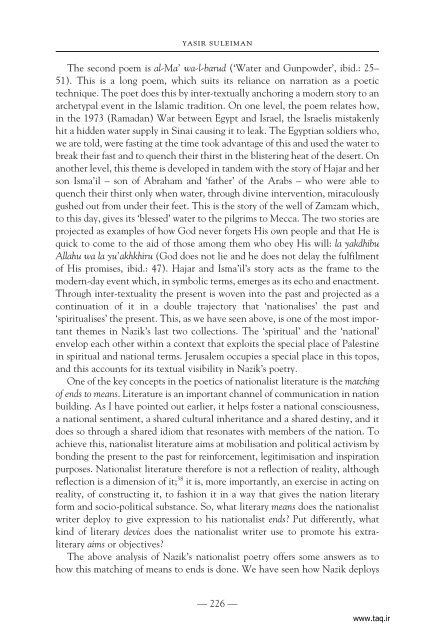LITERATURE AND NATION IN THE MIDDLE EAST
LITERATURE AND NATION IN THE MIDDLE EAST
LITERATURE AND NATION IN THE MIDDLE EAST
- No tags were found...
You also want an ePaper? Increase the reach of your titles
YUMPU automatically turns print PDFs into web optimized ePapers that Google loves.
yasir suleimanThe second poem is al-Ma’ wa-l-barud (‘Water and Gunpowder’, ibid.: 25–51). This is a long poem, which suits its reliance on narration as a poetictechnique. The poet does this by inter-textually anchoring a modern story to anarchetypal event in the Islamic tradition. On one level, the poem relates how,in the 1973 (Ramadan) War between Egypt and Israel, the Israelis mistakenlyhit a hidden water supply in Sinai causing it to leak. The Egyptian soldiers who,we are told, were fasting at the time took advantage of this and used the water tobreak their fast and to quench their thirst in the blistering heat of the desert. Onanother level, this theme is developed in tandem with the story of Hajar and herson Isma’il – son of Abraham and ‘father’ of the Arabs – who were able toquench their thirst only when water, through divine intervention, miraculouslygushed out from under their feet. This is the story of the well of Zamzam which,to this day, gives its ‘blessed’ water to the pilgrims to Mecca. The two stories areprojected as examples of how God never forgets His own people and that He isquick to come to the aid of those among them who obey His will: la yakdhibuAllahu wa la yu’akhkhiru (God does not lie and he does not delay the fulfilmentof His promises, ibid.: 47). Hajar and Isma’il’s story acts as the frame to themodern-day event which, in symbolic terms, emerges as its echo and enactment.Through inter-textuality the present is woven into the past and projected as acontinuation of it in a double trajectory that ‘nationalises’ the past and‘spiritualises’ the present. This, as we have seen above, is one of the most importantthemes in Nazik’s last two collections. The ‘spiritual’ and the ‘national’envelop each other within a context that exploits the special place of Palestinein spiritual and national terms. Jerusalem occupies a special place in this topos,and this accounts for its textual visibility in Nazik’s poetry.One of the key concepts in the poetics of nationalist literature is the matchingof ends to means. Literature is an important channel of communication in nationbuilding. As I have pointed out earlier, it helps foster a national consciousness,a national sentiment, a shared cultural inheritance and a shared destiny, and itdoes so through a shared idiom that resonates with members of the nation. Toachieve this, nationalist literature aims at mobilisation and political activism bybonding the present to the past for reinforcement, legitimisation and inspirationpurposes. Nationalist literature therefore is not a reflection of reality, althoughreflection is a dimension of it; 38 it is, more importantly, an exercise in acting onreality, of constructing it, to fashion it in a way that gives the nation literaryform and socio-political substance. So, what literary means does the nationalistwriter deploy to give expression to his nationalist ends? Put differently, whatkind of literary devices does the nationalist writer use to promote his extraliteraryaims or objectives?The above analysis of Nazik’s nationalist poetry offers some answers as tohow this matching of means to ends is done. We have seen how Nazik deploys— 226 —www.taq.ir






